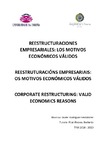Reestructuraciones empresariales : los motivos económicos válidos

Use este enlace para citar
http://hdl.handle.net/2183/27014Coleccións
Metadatos
Mostrar o rexistro completo do ítemTítulo
Reestructuraciones empresariales : los motivos económicos válidosTítulo(s) alternativo(s)
Reestructuracións empresariais: os motivos económicos válidosCorporate restructuring: valid economics reasons
Autor(es)
Director(es)
Álvarez Barbeito, PilarData
2020Descrición
Traballo fin de mestrado (UDC.DER). Mestrado Universitario en Avogacía. Curso 2019/2020Cita bibliográfica
Rodríguez Fernández, Javier, Reestructuraciones empresariales : los motivos económicos válidos. Traballo Fin de Mestrado. Facultade de Dereito, Universidade da Coruña, 2020
Resumo
Las grandes operaciones de reestructuración patrimonial gozan en la
actualidad de un marco regulatorio tendente a facilitar las mismas mediante la concesión de una
importante ventaja tributaria. Sin embargo, una cláusula antiabuso en la misma ley permite al
Fisco rechazar la aplicación de esa bonificación si con la operación únicamente se está
persiguiendo el ahorro fiscal. Desde que esto es así, la batalla legal estaba servida, pues dicho
mecanismo ha supuesto un arma de doble filo: para el contribuyente ha sido, y es una
herramienta fundamental para reducir la carga fiscal todo lo posible dentro del amparo de la
ley, y por otro lado le ha proporcionado a la Agencia Tributaria una potestad discrecional
añadida, de valorar las intenciones reales del contribuyente, con la que poder endurecer sus
procedimientos de comprobación y regularización. Large capital restructuring operations currently have a regulatory framework
to facilitate them by granting a significant tax advantage. However, an anti-abuse clause in the
same law allows the Treasury to reject the application of hat bonus if only tax savings are being
pursued with the operation. Large capital restructuring operations currently have a regulatory
framework to facilitate them by granting a significant tax advantage. However, an anti-abuse
clause in the same law allows the Treasury to reject the application of that bonus if only tax
savings are being pursued with the operation. Since this is so, the legal battle was served,
because this mechanism has meant a double-edged sword: for the taxpayer it has been and is
a fundamental tool to reduce the tax burden as much as possible under the protection of the
law, and, on the other hand, it has provided the Tax Agency with an additional discretionary
power to assess the real intentions of the taxpayer, with which to be able to tighten their
verification and regularization procedures.
Palabras chave
Cláusula antiabuso
Fraude fiscal
Impuesto sobre Sociedades
Reestructuración empresarial
Planificación fiscal
Neutralidad
Economía de opción
Motivos económicos válidos
Anti-abuse clause
Tax fraud
Corporation tax
Corporate restructuring
Tax planning
Neutrality
Economy of choice
Valid economic reasons
Fraude fiscal
Impuesto sobre Sociedades
Reestructuración empresarial
Planificación fiscal
Neutralidad
Economía de opción
Motivos económicos válidos
Anti-abuse clause
Tax fraud
Corporation tax
Corporate restructuring
Tax planning
Neutrality
Economy of choice
Valid economic reasons
Descrición
Traballo Fin de Mestrado (UDC.DER). Mestrado Universitario en Avogacía. Curso 2019/2020





